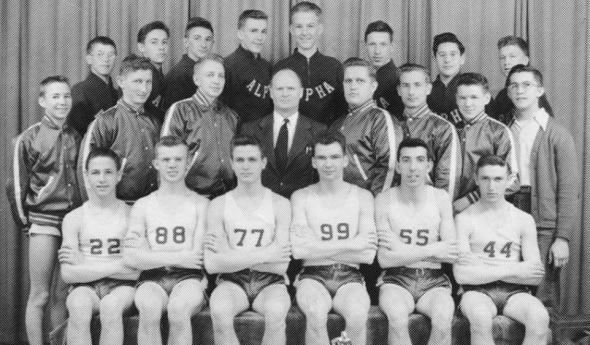
Before the Bridge: Class E & the UP
July 31, 2017
By Ron Pesch
MHSAA historian
This is the final part in a series on MHSAA tournament classification, past and present, that has been published over the last two weeks and originally ran in this spring's edition of MHSAA benchmarks.
The stories are worthy of the silver screen.
Long lost legends of lore, forgotten by most in the Lower Peninsula of the state of Michigan.
Absurd anecdotes of basketball played behind glass, and out-of-bounds lines painted on walls.
Tales of overlooked places like Trenary and Champion and Doelle and Watersmeet.
This is the story of MHSAA Class E basketball.
From 1932 to 1947, Michigan's Upper Peninsula did not compete in the state-sponsored basketball tournament. Instead, the U.P. held a separate basketball tournament, crowning champions in Classes B, C and D. In 1941, the state added a fifth classification – Class E, comprised of schools with a student body numbering 75 or fewer. A fourth bracket was added to the U.P. tourney.
Following the 1948 season, the Upper Peninsula returned to the state tournament. Winners of the traditional U.P. tourney were pronounced regional champions, and advanced to the state quarterfinals in Classes B, C and D. However, since there were no Class E schools with basketball teams in the Lower Peninsula, the winner of the U.P. tournament crown was proclaimed Class E state champion. This arrangement continued through the spring of the 1960 season.
Since they were the state's smallest high schools, the gymnasiums came in all shapes and sizes. Some sported a center circle that intersected with the top of the key. Basketball courts that doubled as a stage required netting to keep the kids and the ball on the court and away from the audience seated below.
Fred Boddy, a former coach at Champion, recalled his first visit to Doelle. Located in copper country near Houghton, the hosts were the proud owners of “the smallest” gym in U.P.
“I couldn't believe my eyes. ... Here on the second floor were windows and bleachers all around filled with fans. The gym, of course, was located on the first floor, but to get into the gym one had to go around to the back of the school to enter through the boiler room to the locker rooms, which opened onto the gym floor much like a dugout on a baseball field. The players sat on a bench under the wall and could look out and see the game in this manner. The free throw lines intersected and there were no out of bounds lines... the wall itself was ‘out of bounds.’ On the floor during the game were 10 players and two referees. There were no sounds as all the fans were up on the second floor, glassed in.
The cheerleaders tried valiantly to fire up the fans up on the second floor, but the teams couldn't hear in the quiet below. The score clock and statistician personnel were placed in a corner box high over the floor in one corner of the gym. They attained this lofty perch by a ladder that was removed from the trap door after all three were in position and the game could thus commence. The timer then tied a rope around his ankle. To send a sub into the game the coach would send the player along the wall heading for this rope. He would pull the rope causing the timer to look down through the trap door and at next opportunity would ring the buzzer and admit this substitute”
Regardless of the challenges presented by these cracker-box gyms, the fans loved their basketball. “The enthusiasm was just the same, if not bigger, than schools twice and 10 times their size,” noted longtime U.P. historian, Jay Soderberg.
Coach Joseph Miheve's 1941 Palmer squad captured the state's first Class E title with a 39-28 win over Hulbert at Ironwood. A graduate of Wakefield High School, Miheve had never played high school basketball, serving as the team's manager.
The 1942 tournament, scheduled for March 19-21, was postponed one week because the city of Marquette was more or less taken over “by nearly 1,000 selective service registrants from every county in the Upper Peninsula” who had another and more serious battle in mind – World War II.
Palmer, this time coached by Elvin Niemi, repeated in Class E with a 37-31 victory over Bergland. It was Palmer's 32nd consecutive victory.
No tournament was held in 1943 due to the involvement of the United States in the war. In the 1944 championship game, Cedarville jumped out to a 19-14 first quarter lead but was held to 24 points in the remaining periods and fell to Amasa, 51-43 at Ishpeming.
Trenary made its lone Class E finals appearance in 1945, losing to Bergland 49-39 at Ishpeming, while the Alpha Mastodons won their first U.P. title since 1934 with a 48-28 win over Champion in 1946. It was the second of five Class E titles for Alpha coach Gerhardt “Gary” Gollakner, one of the finest coaches to come out of the U.P. Gollakner had coached at Amasa two years earlier, and his Mastodons would earn three additional titles during the 19-year run of the Class E championships.
Bergland became the tourney's second two-time winner in 1947, with a 40-37 win over the Perkins Yellowjackets. Perkins made four trips to the Class E finals over the years, including an appearance in the final year of the tournament, but came away empty-handed each time.
The Nahma Arrows made their first appearance in the championship in 1951, losing to Michigamme. Led by coach Harold “Babe” Anderson, a cage star at Northern Michigan College during the early 1940s, the Arrows returned to the finals in 1952. Nahma finished the year with a 21-0 mark and a 64-44 win over Marenisco for the crown.
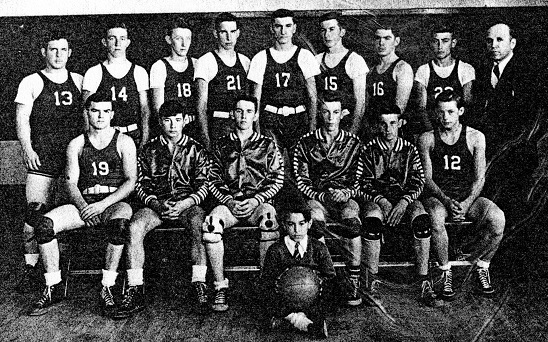 The two teams met again in a finals rematch the following year. The scored was tied six times, while the lead changed hands seven times in this barnburner. With 15 seconds to play, Nahma led 64-60. Marenisco's Robert Prosser hit a jump shot, then teammate Bill Blodgett stole a pass and scored to knot the game at 64. With two seconds remaining, Nahma's Bernard Newhouse was fouled. Newhouse hit the first free throw, but missed on the second. Teammate Wendell Roddy tipped in the rebound, and the Arrows had their second title.
The two teams met again in a finals rematch the following year. The scored was tied six times, while the lead changed hands seven times in this barnburner. With 15 seconds to play, Nahma led 64-60. Marenisco's Robert Prosser hit a jump shot, then teammate Bill Blodgett stole a pass and scored to knot the game at 64. With two seconds remaining, Nahma's Bernard Newhouse was fouled. Newhouse hit the first free throw, but missed on the second. Teammate Wendell Roddy tipped in the rebound, and the Arrows had their second title.
Alpha returned to the championship circle in 1954 with a 52-48 win over Perkins.
The 1955 title game matched a pair of the finest teams in Class E history. Trout Creek, making its first championship appearance, downed Alpha 84-83 in another Class E thriller. Don Mackey led the winners with 39 points. Tony Hoholek paced Alpha with 31, while junior John Kocinski added 21-points for the Mastodons.
Kocinski, a four-year starter at Alpha, scored 1,782 points during his career, then an all-time U.P. record. He once scored 51 points against Amasa, and could have scored more according to teammate Walter “Slip” Ball. “He refused to shoot in the fourth quarter, and passed up one shot after another,” Ball said.
Without question, Trout Creek was one of the powerhouse squads during the final years of the tourney. The Anglers, coached by Bruce “Pinky” Warren, a former captain of Purdue's football team, made four trips to the finals during the last six years of the Class E tourney. The defending champions downed Alpha in the semifinals of the 1956 tournament, then knocked off Hermansville 86-68 in the finals to repeat. It was a year of celebration for fans of U.P. basketball, as four of the state's five champions – Stephenson (B), Crystal Falls (C), Chassell (D) and Trout Creek (E) – came from Michigan's northern peninsula.
Hermansville returned to the finals in the spring of 1957 and earned its second Class E title with a 77-51 win over Michigamme at Escanaba. Trout Creek downed Perkins 61-41 for their third crown in 1958.
The 1959 championship, hosted at Northern Michigan College's fieldhouse, was a showdown of the U.P.’s only undefeated squads, Trout Creek and Nahma. Trout Creek was riding a 24-game winning streak that dated back to the 1958 season. A scoring machine, Warren's Anglers averaged 81.7 points per contest. Nahma, 19-0 on the season, boasted the U.P.'s strongest defense. Still coached by “Babe” Anderson, the Arrows had allowed an average of 38.2 points per game. Led by senior Warren Groleau, Nahma had been last defeated by Trout Creek in the semifinals of the 1958 tourney.
Leading 25-15 at the intermission, Nahma matched Trout Creek point for point in the second half for a 55-45 victory.
Hermansville, behind Richard Polazzo's 29 points and Irwin Scholtz's 27, downed surprise finalist Perkins 72-50 in the 1960 finale, to end this chapter in MHSAA history.
Today, most of the former Class E high schools are long gone. Many have closed their doors and consolidated with other area schools. Amasa and Alpha merged with Crystal Falls to form Forest Park. Palmer is now part of the Negaunee school system. Bergland and Trout Creek joined forces with Class D Ewen to form Ewen-Trout Creek. Hermansville combined with Powers to form North Central, to name but a few. A few remain: Dollar Bay, Marenisco (now Wakefield-Marenisco) and Watersmeet, and their enrollments are much the same as in the glory days of the state's fifth classification.
Author’s note: Special thanks to Jay Soderberg and Roger Finlan, who assisted in gathering statistics and quotes used in this article. Thanks also to Dick Kishpaugh, Bob Whitens, Walter “Slip” Ball, Dennis Grall, Fred Boddy, Bruce Warren, Gene Maki, Harold “Babe” Anderson and the various personnel at U.P. high schools for their contributions to this story.
PHOTOS: (Top) The Alpha boys basketball team won the 1950 Class E title by nearly doubling up Michigamme, 52-28. (Middle) Hermansville claimed the 1948 title with a 58-38 win over Rockland.
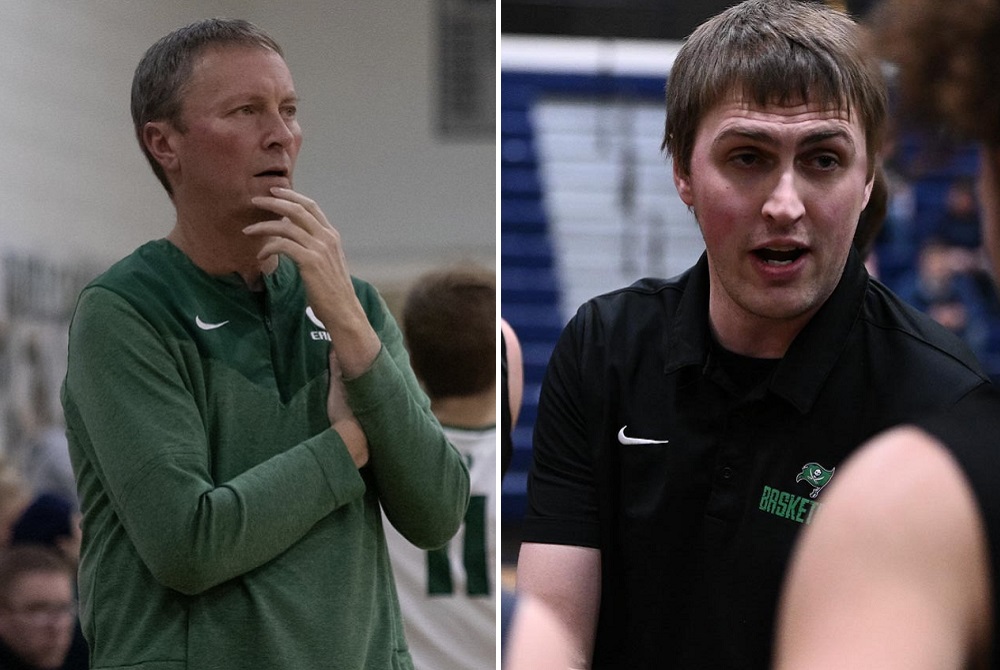
Father & Son Seidl Have Much to Discuss, Notes to Compare From Perfect Starts
By
Doug Donnelly
Special for MHSAA.com
February 7, 2023
Matt and Derek Seidl have a lot to talk about these days.
 The father and son duo both have highly-ranked, undefeated basketball teams going into the first full week of February, something neither of them saw coming.
The father and son duo both have highly-ranked, undefeated basketball teams going into the first full week of February, something neither of them saw coming.
“We were hoping for a season like this, but you never think about winning this many in a row,” said Matt Seidl, the father and head coach of the 15-0 Olivet Eagles. “When our season ended last year, we knew our top seven players would all be returning.”
About 50 miles south of Olivet, in Jackson County, Derek Seidl has the Napoleon Pirates off to a 14-0 start. They are sitting on top of the Cascades Conference.
“We have a really talented group right now,” Derek said. “We were 19-3 last year and brought six guys back. Having that experience has been very valuable.”
Olivet is ranked No. 2 in MPR in Division 2 while Napoleon is No. 9 in Division 3. Both are top-10 teams in the latest Associated Press polls as well.
Matt Seidl, 60, graduated from Ypsilanti Lincoln High School in 1981 and went to Eastern Michigan University to become a sportswriter. He didn’t begin teaching until he was in his early 30s, but, by then, was already a veteran coach.
“It was getting difficult because I was always leaving my job to go coach,” he said. “I decided to go and get my teaching degree.”
He wound up in the classroom, which enabled him to dive deeper into coaching. He spent several years coaching at the middle school and high school levels, boys and girls, with stops at places like Pinckney, Ypsilanti, Manchester, Willow Run and Romulus. He was the JV boys basketball coach at Dexter when his son, Derek, made the team as a freshman.
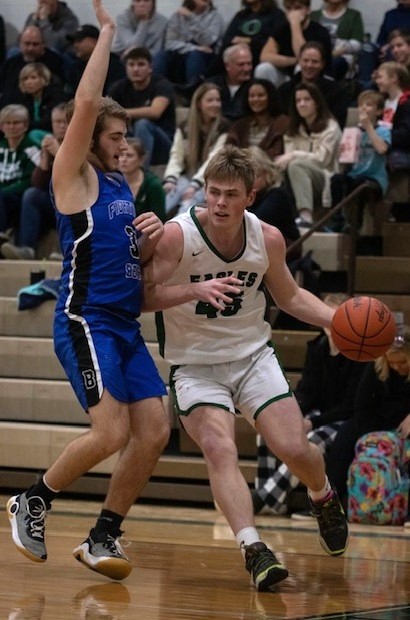 By then, Derek already knew he would be on the bench one day as a coach.
By then, Derek already knew he would be on the bench one day as a coach.
“I played for my dad in youth travel stuff, and he was on staff for one year my freshmen year of high school,” Derek said. “He was a varsity coach all growing up. I was always at games. I loved talking to him about the game, the strategy of it, the Xs and Os. Even when I was younger, I thought about coaching someday. Growing up if you would have asked me what my dream job was, it would have been a teacher and coach.”
Derek, 27, graduated from Dexter in 2014. He played four years of college basketball at Lawrence Tech University. After getting his master’s degree and teaching degree, he got his first coaching job as an assistant coach at Chelsea, under Josh Tropea, who also had coached with Matt.
Derek’s first teaching and head coaching job came at Springport in 2019-20. This is his third year at Napoleon.
“It’s been a really good fit here,” Derek said. “Before I started looking into the job, I barely knew anything about Napoleon. It has worked out well.”
Matt is also the athletic director at Olivet. If he would have had his way, Derek would be coaching at Olivet.
“Derek did a really good job at Springport, and we had an opening and he interviewed and was recommended for the job, but before they offered it to him, Napoleon hired him,” Matt said. “He would have been the perfect choice to teach math and coach basketball.”
With Derek no longer in the running, Matt came out of coaching retirement and was named head coach.
“It was going to be a one-year deal, sort of a band-aid to get us to the next year,” he said.
Instead, Matt’s stayed on and put together quite a successful team. The Eagles have gone 47-6 since the start of the 2020-21 season. This year’s team has taken a big step.
Junior Bo Lincoln, a 5-foot-11 junior point guard, leads the team in scoring (17.1 points per game), assists (3.6 per game), steals (3.0 per game) and free throw percentage at 78 percent.
Drew Priddy, a 6-5 senior center, is averaging about eight points and seven rebounds a game, and junior guard Bryce Wine is averaging nine points a game and leads the team in 3-pointers.
“We had quite the youth movement a few years ago,” Matt said. “We go 8-9 deep now and have a lot of experience. Having those young guys play a couple years ago is paying off.
“We are a good team, but we’re not a 70-possessions-a-game type of team. We know who we are.”
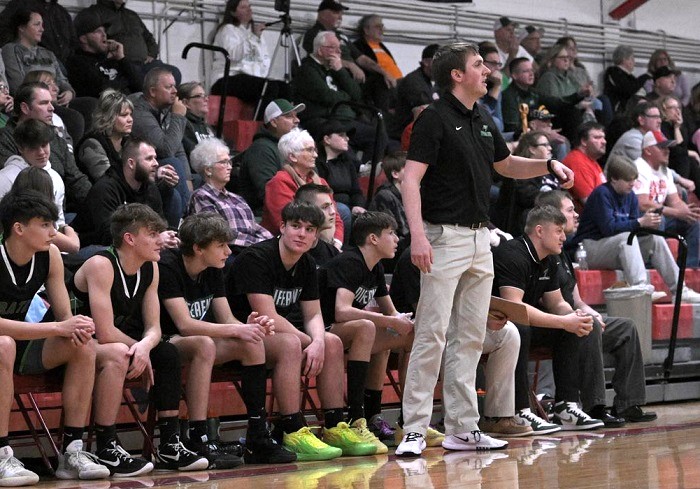 Derek also knows plenty about his dad’s team.
Derek also knows plenty about his dad’s team.
“I definitely keep track of them,” he said. “We talk on the phone on a daily basis – 30 minutes about Napoleon and 30 minutes about Olivet. We bounce things off each other. We run a lot of the same stuff as far as systems. We’re very connected on things.”
Matt and Derek’s teams tried to have a good old-fashioned scrimmage, or exhibition, last year but – with Derek’s team ahead – Matt received two technicals and got kicked out of the game. It’s a fun story for both to tell now.
“That was wild,” Derek said. “It was a cool thing we had going. We were winning so I was enjoying it, but that put a whole different spin on the situation.”
Matt said they probably won’t do that again. Probably.
“My wife said no,” he said. “Derek and I have talked about it, but I don’t know that it would ever happen.”
Derek said one day he’d like to coach with his father.
“I’m very energetic and into it, just like he is,” Derek said. “There are some similarities. I played for him and watched him a lot. I try and pull some of the things he does, being prepared. We get along super well. I don’t know if I could trust him to not get technical fouls.”
He’s kidding, of course.
Napoleon has a core group of four players with a ton of experience.
Devonta Habern is a 5-11 junior who is on the varsity for the third year and runs the show at point guard. Six-foot-5 senior Trent Jester is one of the best big men in the conference. University of Michigan baseball commit Grant Bradley is a three-year varsity starter and outstanding athlete. Holden Vanpoppel is an all-state track athlete who has turned into a pretty good basketball player.
“Grant is super steady and having a great year,” Derek said. “He looks like he’s been in the weight room since he was 5 years old. He can guard anybody. Vanpoppel is an unbelievable run and jump athlete. All four of these guys are averaging in double figures. They are really good athletes who have invested in the program and put the time in.”
“We’ve got a very talented group,” Derek said. “They are a little looser than I am. I tend to be very calculated, kind of analytical and serious. They like to goof around a little bit. They keep me even-keeled. They know when to get serious. It’s good for me to have a group like that.”
Derek said his squad wants to exceed expectations this year.
“We talk about that after every game – don’t be satisfied just because we are undefeated,” Derek said. “There is plenty more to accomplish. Last year we went 18-2 in the regular season and 19-3 overall, but we didn’t win a league or a District. Our guys have bought into that mindset. That’s helped us get to where we are.”
Matt is keeping a close eye on not only his team, but Derek’s as well.
“I probably get more stressed watching his games,” he said. “I’m really proud of what he has been able to do.”
 Doug Donnelly has served as a sports and news reporter and city editor over 25 years, writing for the Daily Chief-Union in Upper Sandusky, Ohio from 1992-1995, the Monroe Evening News from 1995-2012 and the Adrian Daily Telegram since 2013. He's also written a book on high school basketball in Monroe County and compiles record books for various schools in southeast Michigan. E-mail him at [email protected] with story ideas for Jackson, Washtenaw, Hillsdale, Lenawee and Monroe counties.
Doug Donnelly has served as a sports and news reporter and city editor over 25 years, writing for the Daily Chief-Union in Upper Sandusky, Ohio from 1992-1995, the Monroe Evening News from 1995-2012 and the Adrian Daily Telegram since 2013. He's also written a book on high school basketball in Monroe County and compiles record books for various schools in southeast Michigan. E-mail him at [email protected] with story ideas for Jackson, Washtenaw, Hillsdale, Lenawee and Monroe counties.
PHOTOS (Top) Father Matt, left, and son Derek Seidl are leading undefeated boys basketball teams this season at Olivet and Napoleon, respectively. (Middle) Senior Brayden Wine makes a move toward the basket for the Eagles. (Below) Derek Seidl instructs his players. (Olivet photos courtesy of Olivet High School; Napoleon photos by Jeff Steers/JTV.)

